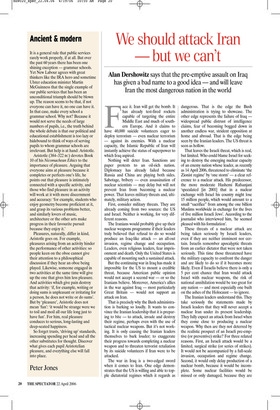Ancient & modern
It is a general rule that public services rarely work properly, if at all. But over the past 60 years there has been one shining exception — grammar schools. Yet New Labour agrees with great thinkers like the IRA hero and sometime Ulster education minister Martin McGuinness that the single example of our public services that has been an unconditional triumph should be blown up. The reason seems to be that, if not everyone can have it, no one can have it. In that case, make every school a grammar school. Why not? Because it would not serve the needs of large numbers of pupils, i.e., the truth behind the whole debate is that our political and educational establishment is too lazy or hidebound to think of ways of serving pupils to whom grammar schools are irrelevant. But help is at hand: Aristotle.
Aristotle (384–322 BC) devotes Book 10 of his Nicomachean Ethics to the importance of pleasure. Arguing that everyone aims at pleasure because it completes or perfects one’s life, he points out that pleasure is intimately connected with a specific activity, and those who find pleasure in an activity will work at it with more discernment and accuracy: ‘for example, students who enjoy geometry become proficient at it, and grasp its various problems better, and similarly lovers of music, architecture or the other arts make progress in their favourite pursuit because they enjoy it.’ Pleasures, naturally, differ in kind, Aristotle goes on. For example, pleasures arising from an activity hinder the performance of other activities: so people keen on the oboe cannot give their attention to a philosophical discussion if they hear an oboe being played. Likewise, someone engaged in two activities at the same time will give up the one that gives him less pleasure. And activities which give pain destroy that activity: ‘if, for example, writing or doing sums is unpleasant or irritating for a person, he does not write or do sums’. But by ‘pleasure’, Aristotle does not mean ‘fun’: ‘it would be strange were we to toil and moil all our life long just to have fun’. For him, real pleasure conduces to serious, long-lasting and deep-seated happiness.
So forget trusts, ‘driving up’ standards, increasing spending per head and all the other substitutes for thought. Discover what gives each pupil Aristotelian pleasure, and everything else will fall into place.


































































 Previous page
Previous page